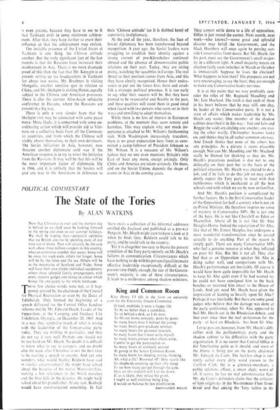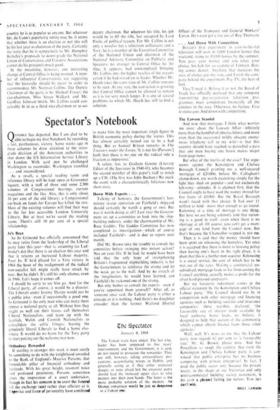POLITICAL COMMENTARY
The State of the Tories
By ALAN WATKINS
Now that Christmas is over and the shortest day is behind us we shall soon be looking forward In the spring and even to our summer holidays. We shall be hoping then—perennial optimists that we British are—to be spending most of our time out of doors. That will certainly be the case with about three million campers in this country, what an enormous number that seems. Some will be away for week-ends, others for longer. Some will be by the lakes and the sea. Others will be in the mountains of Scotland and Wales. Some will have their own simple individual equipment; others those splendid family arrangements, with every modern gadget and device in colour which brings life and gaiety to the whole landscape.
THESE few choice words were not, as it hap- pened, uttered by the chairman of the Council for Physical Recreation or even by the Duke of Edinburgh. They formed the beginning of a speech delivered (so the Central Office handout informs me) by Mr. Edward Heath, Leader of the Opposition, at the Camping and Outdoor Life Exhibition, Olympia, on December 20, 1965. And in a way they symbolise much of what is wrong with the leadership of the Conservative party today. They say nothing in particular. and they do not say it very well. Perhaps one should not be too hard on Mr. Heath. No doubt it is difficult to know what to say to campers, and no doubt also the week after Christmas is not the best time to be making a speech to anyone. And yet, one wonders, what would Stanley Baldwin have said in similar circumstances? He might have talked about the beauties of his native Worcestershire, making a few references to the Welsh marches and the blue hills in the distance. He might has talked about his grandfather. At any rate, Baldwin would have communicated something. In fat there exists a collection of his informal addresses entitled On England and published as a pre-war Penguin. Mr. Heath might care to have a look at it when he finds time. Baldwin could talk to his party, and he could talk to the country.
Yet it is altogether too easy to blame the present condition of the Tory party entirely on Mr. Heath's failures in communication. Circumstances which have nothing to do with his personalqualities make effective leadership exceptionally difficult at the present time. Oddly enough, the size of the Govern- ment's majority is one of these circumstances. It leads to a restlessness among shadow ministers.
They cannot settle down to a life of opposition. Office is just round the corner. Next month, next week—who knows?—some great and splendid disaster may befall the Government, and the black Humbers will once again be purring out- side Conservative front doors. But Mr. Heath, for his part, must see the Government's small major- ity in a different light. A small majority means an election fairly soon (whether in March or October is immaterial). Suppose he loses the election? What happens to him then? The prospects are not very encouraging, to say the least; they are enough to make any Conservative leader nervous.
It is at this point that we may profitably con- sider the roles of Mr. Reginald Maudling and Mr. lain Macleod. The truth is that each of them in his heart believes that he may still, one day, be leader of the Conservative party. It is not a state of affairs which makes leadership by Mr. Heath any easier. One member of the shadow cabinet described it in this way : Ted and fain and Reggie (he said) are circling one another, one eye- ing the other warily. Christopher Soames looks on, and thinks they're all rather common any way. And Enoch thinks that none of the others has any principles. As a picture it seems plausible enough. Nor can Mr. Maudling and Mr. Macleod really be blamed for thinking as they do. Mr. Heath's precarious position is due not to any disloyalty on their part but to the facts of the political situation. Mr. Heath was elected to do a job, and if he fails to do that job we may confi- dently expect the Tory party to react with that ruthlessness which is inculcated at all the best schools and with which we are by now so familiar.
And Mr. Heath's position is complicated by further factors. He is the first Conservative leader of the Opposition for half a century who is not an ex-Prime Minister. He therefore inspires no sense of mystery in Conservative MPs. He is just one of the boys. He is not like Churchill or Eden or Macmillan. Above all he is not like Sir Alec Douglas-Home. Indeed the reputation of Sir Alec, like that of Mr. Ernest Marples, has undergone a most wonderful transformation since he ceased actually to do anything. Part of the reason is simply guilt. There are many Conservative MPs who feel a genuine remorse at what they inflicted on poor Sir Alec. But this is not all. They also feel that as an Opposition speaker Sir Alec is doing rather well, and comparisons with Mr. Heath's performances are inevitable. Of course it would have been quite impossible for Mr. Heath to keep Sir Alec quiet even if he had wanted to; he could not have consigned him to the back benches or returned him intact to the House of Lords. And yet, need Mr. Heath have given the impression of leaning so heavily upon Sir Alec? Perhaps it was inevitable. But there are some good judges who believe that the damage was done at the party conference, when Sir Alec appeared to bail Mr. Heath out in the Rhodesian debate, and that ever since then the real spokesman for the party—at least on Rhodesia—has been Sir Alec.
Let us pass on, however, from Mr. Heath's diffi- culties with the parliamentary party and the shadow cabinet to his difficulties with the party organisation. It is no secret that Central Office is nOt functioning quite as it should, and most of the blame is being put on the party chairman Mr. Edward du Cann. The luckless chap is cur- rently called every dirty word known to the Carlton Club. He is a gimmick-merchant, a public relations officer, a smart aleck; worst of all, it seems, he has no real administrative flair. Mr. du Cann's defenders claim that the criticism of hini originates in the Westminster-Fleet Street &ius. and that among the Tory toilers in the
country he is as popular as anyone. But whatever Mr. du Cann's popularity rating may be, it seems that whether there is an election or not this will be his last year as chairman of the party. Certainly the story that he is sympathetic to Mr. Humphry Berkeley's proposals to down-grade the National Union of Conservative and Unionist Associations cannot do his prospects much good.
In the meantime, however, one interesting change at Central Office is being mooted. A num- ber of influential Conservatives are suggesting that the hierarchy should be recast in order to accommodate Mr. Norman Collins. The Deputy Chairman of the party is Sir Michael Fraser; the vice-chairmen, Miss Susan Walkerk and Mr. Geoffrey Johnson Smith. Mr. Collins could con- ceivably fit in as a third vice-chairman or as co- deputy chairman. But whatever his title, his job would be to fill the role, last occupied by Lord Poole, of political tycoon. For Mr. Collins is not only a novelist but a television millionaire and a Tory; he is a member of the Executive Committee of the National Union and chairman of the National Advisory Committee on Publicity and Speakers; no stranger to Central Office he. Sir Alec, it appears, had contemplated bringing Mr. Collins into the higher reaches of the organi- sation if he had stayed on as leader. Whether Mr. Heath takes the same view of Mr. Collins remains to be seen. At any rate, the conviction is growing that Central Office cannot be allowed to remain as it is for very much longer. It is one of several problems to which Mr. Heath has still to find a solution.































 Previous page
Previous page